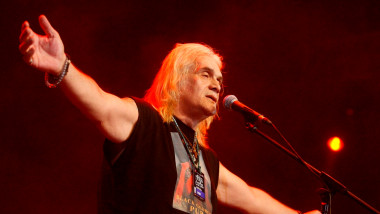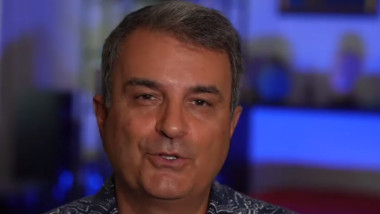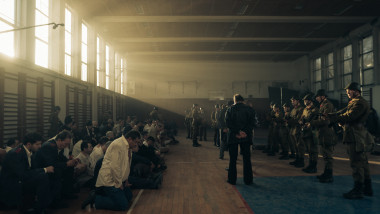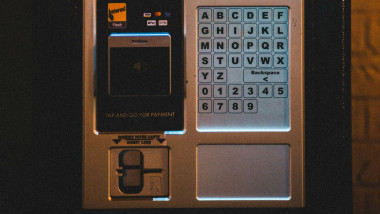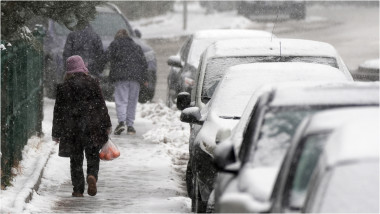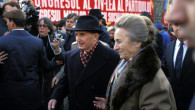Editorial I was in „1984”. Not reading it. Living it.
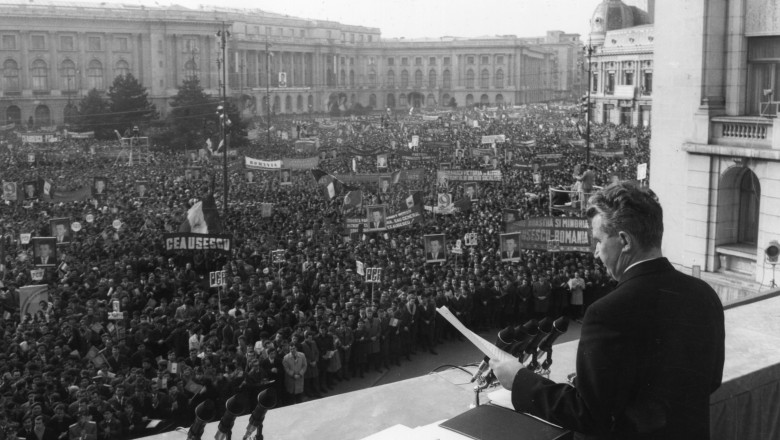
The guy was calmly smoking at the end of the hallway, looking official and somehow menacing in his Bogart-style trench-coat and military style haircut. Every top of the hour he was engulfed in a flurry of students, most of them in blue jeans and (almost) trendy jackets, cautiously enjoying their break and carefully avoiding his proximity and eye contact. They never talked close to him. And even when the courses finished and everybody rushed home, turning the hallway quite busy, there was a kind of boundary around him, a DMZ of sorts, keeping him isolated in a bubble maybe 10 feet deep. Nobody wanted to touch the guy inadvertently.
That would have been dangerous and we knew it.
The year was 1989, December. The place was an university (the Hidrotechnic Faculty) in Bucharest, Romania. I was one of those students keeping quiet around the man. He was a secret agent - well, not so secret to us, anyway.
The Bogart guy had been there since November, making sure that the Securitate, the secret police of Romania, had advance warning on any suspicious student activity. But he was also on a warning mission: and that was the reason he was not trying to hide and to blend in. The Party wanted us to know that it’s got its eye on us.
“Don’t tell any political joke in a group larger that 5. One of you is going to be a snitch” was already the saying for some years, and not many people laughed entirely convinced it was false.
Of course, we now know it was an exaggeration. Slightly. Out of 22 million people we “only” had 500.000 snitches, some even 15-16 years old. By numbers alone, it was probably the largest industry in the country. And their actual number was amplified by the pervasive fear. Hence, the 1 in 5 joke.
The last years of dictatorship in the Socialist Republic of Romania were particularly harsh on daily lives. My parents had to cue for at least one hour per day just for basic groceries. Bucharest, the capital, was lucky to be among the few places where bread was not rationed - providing you shopped before 9 AM. But cooking oil and sugar were. You could only buy them upon presenting a cute little paper card that had to be stamped by the store clerk every time you got your bottle or sack. Meat? Out of an entire pig slaughtered, only the legs stayed in the country - and were sold in grocery stores as something we called - in derision – “Adidas meat”… The rest was exported for hard currency.
We were the first Europeans back into the Paleo Diet. Our daily intake of calories was probably under 2000, and protein was probably less than half of the needs of a human body.
And, hey, I’m not even talking Walkmans and David Bowie tapes - even though they were ungettable as well.
I’m talking basic food. We were malnourished, in a place that for centuries - during the Middle Ages - had provided food not only for itself, but also for Istanbul, the capital of the Ottoman Empire!
What went wrong in just 30 years? Why had socialism produced such a mess, when in theory it was supposed to make the working classes affluent, the masses happy and entire peoples free?
I don’t have a short answer. Nor one that will fit on a facebook meme. Or an instagram story to adore.
But here’s my take: true socialism cannot work if people change their minds. And that’s a big problem. Because changing minds it’s something that our species is quite prone to do- especially in the face of changing circumstances. True socialism cannot allow that, because it can’t work in 4 or 5 years elections cycles. It needs time to prove itself.
It needs lifetimes.
And guards. Bogart types. Or even worse.
Here’s the reason why.
Let’s say, you decide that it’s better for a part of the economy to go from private to public. (Let’s be clear: to be expropriated by the government. As in forcefully taken.) And let’s say you pick agriculture. You take people’s lands, rich and poor, and force everybody in the countryside to work in what we used to call co-ops (actually the Romanian term was Cooperativa).
Now, the socialist logic is quite strong here: bigger exploitations get better yields. There’s going to be more wheat to share. The rich will get less - but they’ll be okay - and the poor will finally get prosperity. Great, isn’t it? There’s even a surplus that the state can take and wisely invest in industry.
Now let’s see what happens in practice. When everybody gets the same, why would people work harder? Or even hard? Or even work at all? There isn’t a simple answer to this effect, but actual socialism saw it take place everywhere in the Eastern bloc: the freeloader category simply exploded. Equal distribution led to equal distaste for work. Not because people don’t like to work…
But because being equally rewarded meant also that there was no way of making a difference!
Guess what: that’s the meaning of life for most of mankind. Not 42.
So people lost motivation. The yields decreased. Then the bureaucrats came up with the idea of introducing a smaller inequality, under its control: payment on “performance”. I won’t bother you with details, but the idea was that you got more for your troubles - mostly for working more, not better. That sounded good for a while, but in time proved it had another, more perverse flaw:
This time it was an Institution that decided how rich or poor you were, not the market forces. Nor your skill to sell your produce at favorable prices.
An institution that decides on people’s lives… interesting. Instead of Warren Buffet or Merrill Lynch, lets’ get a People’s committee. Doesn’t that sound great?
Well, yeah. Lovely.
But, wait, what if it makes mistakes? Can a committee, whose members are nominated by the single party, emboldened by such nice socialist ideals, ever be wrong on the subject of who gets 5 dollars (or “Lei”, the Romanian currency) more?
You’d be surprised. More often than not.
In practice, for decades, the committee awarded the extra dough very rarely on people who worked harder. Mostly, the extra 5 bucks went to people who were more outwardly supportive of the official ideology. Or to friends of the members of the committee. Or to snitches. Or “activists”. Finally, to jerks. As we all know, jerks are better than anybody else at getting public money. In any society.
Now I know what you’re thinking, as people living in democratic societies: “Well, if it’s that bad maybe we should change that institution!” (Or:” it’s not socialism’s fault, it’s just the way those remote people in Eastern Europe implemented it.”)
Not so fast.
That institution that you fancy changing IS socialism. Its power over people forms the backbone of the regime power. Change it, and you could allow inequality to rise - because by now we know that people are not the same. Smarter people could get more grains. Harder working people too. Rich people might reappear. And they could challenge the official power.
Sorry, but socialism cannot allow that. True socialism cannot let people change their minds. Once embraced, its entire logic relies on staying in power indefinitely, against the (eventually different) will of the people.
Until it’s usually too late. And until too many generations went lost to a life without freedom. It happened to my mother’s and father’s generation. And half of the life of my grandparents. Also, half of my youth…
I still live in Romania today. Our GDP is probably 5 times the one in 1989, our last year of communism. The only difficulty in getting bread at the corner shop is deciding which one should you choose (go for the sesame seed variety, if you visit!). People are free to speak their mind. To work harder. Or risk being poor.
And then the siren song of Socialism sneaks back in.
Some think we (“we” means the government, of course) should take away other people’s Beemers and redistribute the (meagre) wealth we have created. Not just in Romania - but surprisingly in other places too. America, is that really you?
This is the reason I wrote this piece.
To remind people that good intentions can be a very nicely lit road to hell. And also the make them understand that there cannot be competition without people left behind. These people we should help. But not by stopping the winners and sending them backwards.
Life, as I understand it now, at 52, is not a journey, as the song says. We are not tourists. Not even travelers. We are stranded here, on limited resources, and we must make the best for ourselves.
Best. Better. Not equal.
Now…
If you read this far, I could probably get away with another 1989 story. A shorter one, I promise.
I remember I was very bad at special mathematics. So bad, that I took the habit of reading literature during class, hidden from the eyes of the teacher by a larger student in front of me. That autumn, someone lent me “1984”, the novel, and I started reading it instead of the Riemann equations on the blackboard. One hour passed. Then two… When all my classes were finished, I was at page 100. But I had to go home, so I closed the book, put it in my backpack, and quietly left the room. Then the building, passing by the not-so-secret agent, then the doorman and the big billboards outside proclaiming the victory of the socialism.
I took the tram home, thinking about the book, the Ministry Of Truth, the Doublespeak and the general atmosphere of suffocation and anxiety that Orwell so cleverly builds in your mind.
And then, I realized why it seemed so familiar to me.
I lived in that book!
More than that, I couldn’t just close my country, as I did with that paperback.
I was in 1984. Not reading it. Living it.
It was only 5 years later than its title: quite a small margin of error for Orwell.
But one the size of their lives for hundreds of millions of people.
Luckily, you don’t have to be one of them.
Again.
Lucian Mindruta - journalist, Bucharest, Romania









